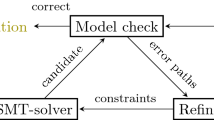Abstract
We present an algorithm for solving two-player safety games that combines a mixed forward/backward search strategy with a symbolic representation of the state space. By combining forward and backward exploration, our algorithm can synthesize strategies that are eager in the sense that they try to prevent progress towards the error states as soon as possible, whereas standard backwards algorithms often produce permissive solutions that only react when absolutely necessary. We provide experimental results for two new sets of benchmarks, as well as the benchmark set of the Reactive Synthesis Competition (SYNTCOMP) 2017. The results show that our algorithm in many cases produces more eager strategies than a standard backwards algorithm, and solves a number of benchmarks that are intractable for existing tools. Finally, we observe a connection between our algorithm and a recently proposed algorithm for the synthesis of controllers that are robust against disturbances, pointing to possible future applications.
Access this chapter
Tax calculation will be finalised at checkout
Purchases are for personal use only
Similar content being viewed by others
Notes
- 1.
This part is the light-weight backward search: unlike UPRE in the standard backward algorithm, preimage does not contain any quantifier alternation.
- 2.
This is the only place where our algorithm uses image, and it is only included to keep the definitions and correctness argument simple - the algorithm also works if the model checker omits this last image computation step, see Sect. 5.
- 3.
It may be a subsequence due to the merging of error levels from different iterations of the main loop.
References
Church, A.: Applications of recursive arithmetic to the problem of circuit synthesis. Summ. Summer Inst. Symb. Logic I, 3–50 (1957)
Büchi, J., Landweber, L.: Solving sequential conditions by finite-state strategies. Trans. Am. Math. Soc. 138, 295–311 (1969)
Pnueli, A., Rosner, R.: On the synthesis of a reactive module. In: POPL, pp. 179–190. ACM Press (1989)
Filiot, E., Jin, N., Raskin, J.F.: Antichains and compositional algorithms for LTL synthesis. Form. Methods Syst. Des. 39(3), 261–296 (2011)
Ehlers, R.: Symbolic bounded synthesis. Form. Methods Syst. Des. 40(2), 232–262 (2012)
Sohail, S., Somenzi, F.: Safety first: a two-stage algorithm for the synthesis of reactive systems. STTT 15(5–6), 433–454 (2013)
Finkbeiner, B., Schewe, S.: Bounded synthesis. STTT 15(5–6), 519–539 (2013)
Bloem, R., Könighofer, R., Seidl, M.: SAT-based synthesis methods for safety specs. In: McMillan, K.L., Rival, X. (eds.) VMCAI 2014. LNCS, vol. 8318, pp. 1–20. Springer, Heidelberg (2014). https://doi.org/10.1007/978-3-642-54013-4_1
Legg, A., Narodytska, N., Ryzhyk, L.: A SAT-based counterexample guided method for unbounded synthesis. In: Chaudhuri, S., Farzan, A. (eds.) CAV 2016. LNCS, vol. 9780, pp. 364–382. Springer, Cham (2016). https://doi.org/10.1007/978-3-319-41540-6_20
Jacobs, S., et al.: The first reactive synthesis competition (SYNTCOMP 2014). STTT 19(3), 367–390 (2017)
Dallal, E., Neider, D., Tabuada, P.: Synthesis of safety controllers robust to unmodeled intermittent disturbances. In: CDC, pp. 7425–7430. IEEE (2016)
Jacobs, S., et al.: The 4th reactive synthesis competition (SYNTCOMP 2017): benchmarks, participants & results. In: SYNT@CAV. Volume 260 of EPTCS, pp. 116–143. (2017)
Liu, X., Smolka, S.A.: Simple linear-time algorithms for minimal fixed points. In: Larsen, K.G., Skyum, S., Winskel, G. (eds.) ICALP 1998. LNCS, vol. 1443, pp. 53–66. Springer, Heidelberg (1998). https://doi.org/10.1007/BFb0055040
Cassez, F., David, A., Fleury, E., Larsen, K.G., Lime, D.: Efficient on-the-fly algorithms for the analysis of timed games. In: Abadi, M., de Alfaro, L. (eds.) CONCUR 2005. LNCS, vol. 3653, pp. 66–80. Springer, Heidelberg (2005). https://doi.org/10.1007/11539452_9
Finkbeiner, B., Jacobs, S.: Lazy synthesis. In: Kuncak, V., Rybalchenko, A. (eds.) VMCAI 2012. LNCS, vol. 7148, pp. 219–234. Springer, Heidelberg (2012). https://doi.org/10.1007/978-3-642-27940-9_15
Kropf, T.: Introduction to Formal Hardware Verification. Springer Science & Business Media, Berlin (2013)
Somenzi, F.: CUDD: CU decision diagram package, release 2.4.0. University of Colorado at Boulder (2009)
Neider, D., Weinert, A., Zimmermann, M.: Synthesizing optimally resilient controllers. In: CSL (2018, to appear)
Ehlers, R., Topcu, U.: Resilience to intermittent assumption violations in reactive synthesis. In: HSCC, pp. 203–212. ACM (2014)
Huang, C., Peled, D.A., Schewe, S., Wang, F.: A game-theoretic foundation for the maximum software resilience against dense errors. IEEE Trans. Softw. Eng. 42(7), 605–622 (2016)
Raman, V., Donzé, A., Sadigh, D., Murray, R.M., Seshia, S.A.: Reactive synthesis from signal temporal logic specifications. In: HSCC, pp. 239–248. ACM (2015)
Acknowledgments
We thank Bernd Finkbeiner and Martin Zimmermann for fruitful discussions. This work was supported by the German Research Foundation (DFG) under the project ASDPS (JA 2357/2-1).
Author information
Authors and Affiliations
Corresponding author
Editor information
Editors and Affiliations
Rights and permissions
Copyright information
© 2018 Springer Nature Switzerland AG
About this paper
Cite this paper
Jacobs, S., Sakr, M. (2018). A Symbolic Algorithm for Lazy Synthesis of Eager Strategies. In: Lahiri, S., Wang, C. (eds) Automated Technology for Verification and Analysis. ATVA 2018. Lecture Notes in Computer Science(), vol 11138. Springer, Cham. https://doi.org/10.1007/978-3-030-01090-4_13
Download citation
DOI: https://doi.org/10.1007/978-3-030-01090-4_13
Published:
Publisher Name: Springer, Cham
Print ISBN: 978-3-030-01089-8
Online ISBN: 978-3-030-01090-4
eBook Packages: Computer ScienceComputer Science (R0)




